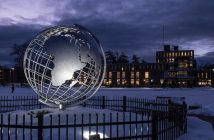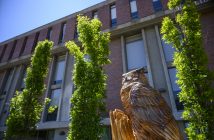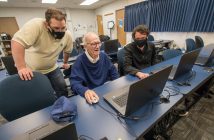This 2007 alum is researching plans of attack against ‘superbugs’.
Earlier this year, Kenneth “KP” Smith ’07, Ph.D., and a colleague published research on more than 11,000 molecules they evaluated in labs at Beth Israel Deaconess Medical Center and Harvard Medical School in Boston.
Together, the scientists determined the compounds’ ability to fight carbapenemresistant Enterobacteriaceae (CRE)—an antibiotic-resistant bacteria deemed “extremely dangerous” because it is not treatable by commonly used antibiotics. The Centers for Disease Control has classified CRE as one of the most urgent antimicrobial resistance threats, Dr. Smith notes, adding, “Our goal is to identify new treatments.”
The work by Dr. Smith and his mentor, James Kirby, M.D., director of the Clinical Microbiology Laboratory at Beth Israel Deaconess Medical Center and associate professor of pathology at Harvard Medical School, identified nearly 80 compounds that inhibit the bacteria. That is good news in the effort to combat strains of bacteria, known as “superbugs,” that are not treatable with conventional antibiotics, Dr. Smith says.
Dr. Smith has been a post-doctoral research fellow at Beth Israel Deaconess Medical Center for just over a year. In that full-time position, he continues to develop research projects at Beth Israel and at Harvard Medical School, and he designs and conducts experiments to contribute to scientific literature.
After graduating with a degree in biology from Westfield State, he earned a master’s degree in biology at Eastern New Mexico University in 2010 and a Ph.D. in microbiology and molecular genetics at the University of Vermont in 2015. Dr. Smith credits Westfield State with fostering his interest in, and passion for, science.
Part of that zeal came from University professors, including Michael Vorwerk, Ph.D., chair of Environmental Science; Carl Grobe, Ph.D., biology professor; Randi Darling, Ph.D., associate biology professor; and Lisa Plantefaber, associate dean of Research and Assessment. “These professors were extremely enthusiastic about topics that others might not have been as excited about,” Dr. Smith says. Their appetite for knowledge carries over into Dr. Smith’s own projects at Beth Israel and teaching opportunities in the research lab, where he trains personnel.
For today’s students studying science at Westfield State—with the added benefit of the new Science and Innovation Center—Dr. Smith has some advice: “Get involved in research early on in your undergraduate studies. That will help you answer the question ‘Is science really for you?”’ he says.
“Research science means that no one has ever really done this stuff,” Dr. Smith adds. To engage in that kind of work, he believes future researchers need to be committed and love what they do. “It’s not really a nine-to-five job,” he says. “You are choosing a lifestyle.”




